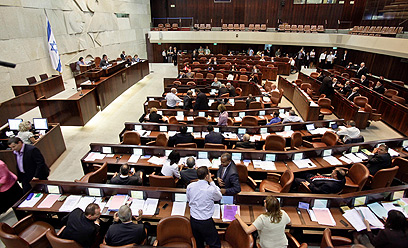
Poll asks about prospects of female, haredi or Arab PM
Democracy Index survey shows most Israelis comfortable with prospect of female PM, but much less so with Arab or haredi premier; despite recent tent protest, 70% of Israelis feel they 'can't make a difference', don't believe they can influence decision makers
A survey conducted by the Israel Democracy Institute sought to reveal, among other things, the public's reaction to the prospects of a female, haredi or Arab prime minister.
In the annual Democracy Index presented to President Shimon Peres on Sunday, respondents were asked how they would feel if a woman were to serve as Israel's prime minister. According to the results, 43% of haredim, 10.2% of the religious public, 8.6% of traditionalists and 3.6% of seculars said it would bother them.
Related stories:
- Abbas: Netanyahu most rigid Israel leader
- Israelis seek EU passports amid existential angst
- 62%: Religious part of social protest too
Asked the same question with the difference of a haredi person as premier, only 3.3% of haredim expressed opposition, but the rates were much higher with the rest of the Israeli public: 53.8% of traditionalists and 79.3% of seculars all felt strongly against the possibility.
The most resistance, however was recorded in relation to the concept of an Arab prime minister: Some 79% of seculars; 88.2% of traditionalists; 91.4% of haredim; and 98% of the religious public expressed opposition to the idea of an Arab premier. The data indicated that none of the leftists opposed a female prime minister but 58.5% said it would bother them to see an Arab prime minister.
In the subject of Jewish-Arab relations, one third of Jewish respondents replied they did not regard Arab citizens as "Israelis."
A total of 77.9% of Jews endorsed a Jewish majority in major decisions concerning peace, security as well as socio-economic and governing matters – 69.5%. The majority of Jews – 52% - rejected the claim that Arab-Israelis were underprivileged.
Finally, asked about the state of Israeli democracy, half of the respondents - 52.3% - answered that Israel's democracy was functioning well. Dissatisfaction was most evident among young Israelis, the ultra-Orthodox sector and Arab-Israelis.
Knesset's approval rating only 51.6%
Otherwise, some 70.6% of respondents in the survey said they had little to no influence on decision-makers and some 56.4% said politicians do not tend to consider the views of the "little man."
Most data was collected last March, prior to the eruption of the tent protest, but some of the questions were revisited in September in the wake of the mass social protest.
The study shows a rise in public confidence towards nearly all institutes and senior public servants: The Israel Defense Forces were rated highest in public confidence with 85.8% - 93.6% of Jews and only 41.6% of Arabs; the president rated 77.8%; Knesset – 51.6%; government – 51%; prime minister – 49.% and Chief Rabbinate – 48%.
Respondents were also asked to address the issue of full equality for Arab citizens. Some 78.9% of seculars and 68% of traditionalists supported granting full equality to Arabs, whereas only 50.5% of the religious public and 26.9% of haredim shared the same view.
The data also indicated that 42.3% of those regarding themselves right-wing supported full equality for Arabs compared with 74.6% of centralists and 93.4% of leftists.
- Follow Ynetnews on Facebook
- Receive Ynetnews updates directly to your desktop












